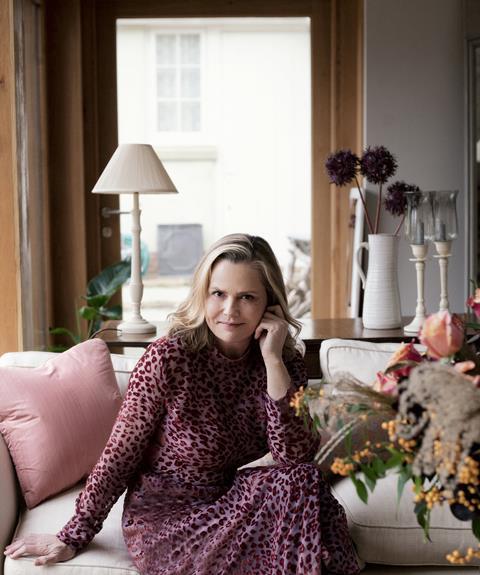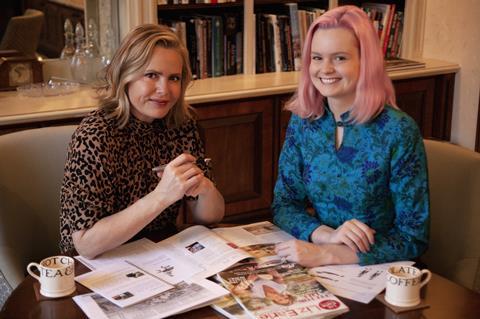Macaila Britton talks to Liz Earle MBE, wellbeing brand founder, about her experience in the industry and what still needs to change

All images: Liz Earle Wellbeing Magazine
Known for her successful skincare and beauty brand, Liz Earle has been writing about health and wellbeing for 35 years, and says she aligned her career with what transpired in her own life. “In the early days I had very bad skin. I had a lot of problems with eczema and skin sensitivity, so that was my real focus. From there, I had my children. I talked about healthy pregnancy, baby foods, postnatal health. When I went into business I continued with my health and beauty writing. Going through my late 40s, experiencing my own hormonal changes, by the time menopause hit in my 50s, I kept thinking: ‘Why is there no information about this?’”
Liz elaborated: “I was even slightly reluctant to even talk about [menopause] because the association was so negative. It was associated with women who were old and decrepit – confused, unfit and at the tail end of life. I wrote my main book on menopause five years ago, called, The Good Menopause Guide (Orion Spring). There was very little out there and in fact my publishers were even hesitant about putting the word menopause on the front cover because they said it’s still taboo and books on menopause don’t sell. But what’s happened over the last few years is that there’s been a number of unbelievably empowering ambassadors in the public eye. It has almost rebranded the menopause.”
When women and girls are equipped with knowledge and resources, it contributes to and enables a cycle of equality and prosperity. Liz believes that one day, her granddaughters will look back on this time and say: “‘What do you mean they didn’t give you your hormones back?’ ‘What do you mean you couldn’t get your estrogen?’ ‘What do you mean nobody gave you any testosterone? How did you survive without that?’ We’re just reclaiming our natural hormones. We’re not asking for anything special. Testosterone declines in women’s 40s and beyond, just like estrogen does. It’s just not [about] libido and sex drive; it’s a really important part of brain health, cognitive function, memory and clarity of thought, as well as being important for muscle mass. It keeps us physically and mentally strong.”
The need for correct diagnosis
Liz is one of the many advocates fighting for health rights and equality for quality of life. Men don’t have the disadvantage women have, where they need to ask for recognition on menopause. They don’t face the need for healthy diagnosis and information simply to be able to perform daily tasks. Men don’t face the debilitating side effects of menopause if left unequipped, unsupported and untreated.
As Liz explains: “What happens when you start to lose your hormones is your sleep suffers. Your anxiety may be off the scale. You may get a lot of physical symptoms like achy joints and osteoporotic fractures. [Women’s] risk of heart disease increases. On many levels, lack of healthcare for menopause is very damaging – not only for personal human cost but we are losing women in the workplace. We are losing experienced business leaders. Families are being destroyed. Relationships break down because of anxiety and stress.” Some women struggle with not wanting “to leave the house. [Women can become] agoraphobic or stop driving. They may become irrational and obsessed with certain things – and this may well be due to losing estrogen in the brain.”
Menopause was associated with women who were old and decrepit
Incorrect diagnoses are given to women and medication is prescribed that will not treat what is actually going on within their bodies. Liz explained that “women are wrongly prescribed anti-depressants in far too great a number. There’s no evidence that anti-depressants help with menopausal anxiety or depression caused by low estrogen. They are for treating clinical depression they don’t replace your estrogen. Anti-depressants create a feeling of numbness, flatness and loss of joy.” It’s important to have doctors who can properly evaluate and understand when the body is experiencing symptoms directly linked to the menopause.
The conversations need to happen in church too
Women’s health is not just a secular issue. Women’s health and menopause need to be discussed in our places of worship.
As a society, we must politely demand our churches and congregations allow space for women to be informed, equipped and supported.

Liz shared how “the church community has amazing opportunities all around fellowship of all kinds…I don’t know whether it would be dedicated menopause cafés or whether that’s too much and women would feel awkward about that – but having [accessible church-based information and community support] would be great.”
Churches also need to be equipped with the tools to support women: “One of the things that’s being campaigned for at the moment is to have menopause policies in the workplace and I think that applies to church communities as well. Just as every church organisation presumably will have maternity policies, there should be a menopause policy.”
We must ask and encourage our leaders and prominent faith figures to prioritise women’s health. Liz said that it begins with asking church leaders: “What is your menopause policy?” This will start dialogue, but we must also advocate that policies and support have “good-quality information on health care. Menopause conversations and support is not just about someone saying, ‘we can put more fans on desks and open some windows’. Women need a bit more than that quite frankly and giving women the space to talk openly about how they can celebrate the second half of their life within the Church and places of employment is essential in making that happen and normalising the stages of life they are entering or currently navigating.”
Menopause is “a natural part of how our bodies are designed to be. And when you think of the amazing women working within the Church, we need to protect them and give them the resources they need. There are so many women now working within the church community on all levels, and it would be such a shame if they weren’t supported through this natural stage of life so that they can continue to carry on doing what they’re doing; the wonderful work of supporting others.”
Liz’s words struck a chord. If we as a Church and as a society want to support women, we also need to feel comfortable as young girls and women using the resources to help ourselves. If we aren’t in a space where resources are accessible and normalised, this hinders the work and calling the Lord has placed on our lives. If women can’t mentally, emotionally or physically take care of themselves, how do we expect them to support others?
Focusing on menopause and women’s health is also a way to minister to the general population who doesn’t have a relationship with Christ. Liz shared the jarring statistics that “here in the UK, the highest rate of suicide is in women aged 51. And the average age of menopause in the UK is 51.” Liz believes that “there is a very strong association between those two. Women become desperate when they lose their hormones. Think of the amount of information we have about pregnancy and childbirth – not all women will have a baby. Every woman will have a menopause. Every single woman. A significant number of young women will go through menopause in their 30s and 40s and may not connect it to low levels of hormones.”
Advocating for menopause as Christians is in direct alignment with “what the Church is all about too – supporting others. Menopause advocacy is such a wonderful thing to be part of. There is good news out there on every level and it’s our job as empowered and informed women to share that with others and hopefully bring them on the journey too.”
Liz Earle MBE is a British writer, TV presenter and award-wnning entrepreneur. She has written over 35 books on beauty, nutrition and wellbeing, and, is a familiar face in the health and wellness industry. Liz is the founder of Liz Earle Wellbeing, a bi-monthly magazine, and Liz Earle Fair and Fine, a Fairtrade jewellery brand. She also co-founded the skincare company, Liz Earle Beauty Co., now owned by Walgreen Boots Alliance, in 1995.
Liz Earle was one of the founding members of the Guild of Health Writers and co-founded the Food Labelling Agenda (FLAG). She is an ambassador and advocate for several charities including Tearfund, The Soil Association, The Sustainable Food Trust and Compassion in World Farming. In 2010, Liz founded the humanitarian charity LiveTwice, which works to help break the cycle of poverty, abuse and unemployment that destroys the individual and leads to the breakdown of families and society.






























